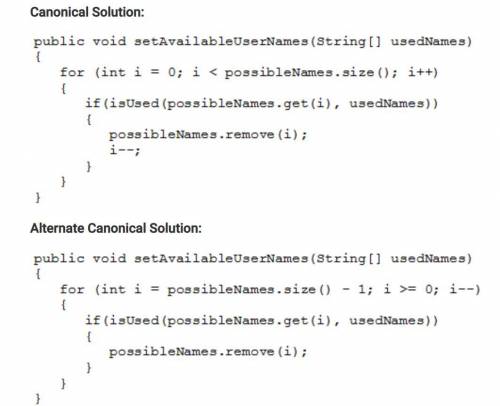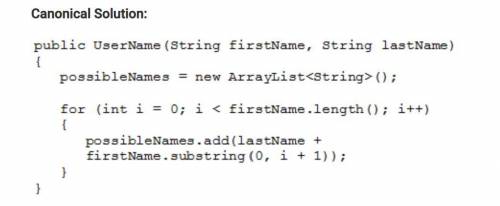Public class UserName
{
// The list of possible user names, based on a user’s first and...

Computers and Technology, 20.02.2020 08:01 tiaholmes31
Public class UserName
{
// The list of possible user names, based on a user’s first and last names and initialized by the constructor.
private ArrayList possibleNames;
/** Constructs a UserName object as described in part (a).
* Precondition: firstName and lastName have length greater than 0
* and contain only uppercase and lowercase letters.
*/
public UserName(String firstName, String lastName)
{ /* to be implemented in part (a) */ }
/** Returns true if arr contains name, and false otherwise. */
public boolean isUsed(String name, String[] arr)
{ /* implementation not shown */ }
/** Removes strings from possibleNames that are found in usedNames as described in part (b).*/
public void setAvailableUserNames(String[] usedNames)
{ /* to be implemented in part (b) */ }
}
a. Write the constructor for the UserName class. The constructor initializes and fills possibleNames with possible user names based on the firstName and lastName parameters. The possible user names are obtained by linking lastName with different substrings of firstName. The substrings begin with the first character of firstName and the lengths of the substrings take on all values from 1 to the length of firstName. Example: firstName: "John" lastName: "Smith". After the code segment has been executed, the possibleNames instance variable of person will contain the following String objects in some order. "smithj", "smithjo", "smithjoh", "smithjohn"
b. Write the UserName method setAvailableUserNames. The method removes from possibleNames all names that are found in usedNames. These represent user names that have already been assigned in the online system and are therefore unavailable. The helper method isUsed has been provided and is properly implenented, and must be used. The isUsed method searches for name in arr. The method returns true if an exact match is found and returns false otherwise.
statement: String[] used = {"harta", "hartm", "harty"};
statement: UserName person2 = new UserName("mary", "hart");
possibleNames after statement execution: "hartm", "hartma", "hartmar", "hartmary"
statement: person2.setAvailableUserNames(used) ;
possibleNames after statement execution: "hartma", "hartmar", "hartmary"

Answers: 1


Other questions on the subject: Computers and Technology

Computers and Technology, 23.06.2019 21:30, mariah10455
Write a fragment of code that reads in strings from standard input, until end-of-file and prints to standard output the largest value. you may assume there is at least one value. (cascading/streaming logic, basic string processing)
Answers: 3

Computers and Technology, 23.06.2019 22:20, tagerryawilson6
If i uninstall nba 2k 19 from my ps4 will my career be gone forever?
Answers: 2

Computers and Technology, 24.06.2019 02:10, sIatt
Consider the usual algorithm to convert an infix expression to a postfix expression. suppose that you have read 10 input characters during a conversion and that the stack now contains these symbols: (5 points) | | | + | | ( | bottom |_*_| now, suppose that you read and process the 11th symbol of the input. draw the stack for the case where the 11th symbol is
Answers: 2

Computers and Technology, 24.06.2019 14:40, drecooks713
Create a function (prob3_6) that will do the following: input a positive scalar integer x. if x is odd, multiply it by 3 and add 1. if the given x is even, divide it by 2. repeat this rule on the new value until you get 1, if ever. your program will output how many operations it had to perform to get to 1 and the largest number along the way. for example, start with the number 3: because 3 is odd, we multiply by 3 and add 1 giving us 10. 10 is even so we divide it by 2, giving us 5. 5 is odd so we multiply by 3 and add one, giving us 16. we divide 16 (even) by two giving 8. we divide 8 (even) by two giving 4. we divide 4 (even) by two giving 2. we divide 2 (even) by 2 to give us 1. once we have one, we stop. this example took seven operations to get to one. the largest number we had along the way was 16. every value of n that anyone has ever checked eventually leads to 1, but it is an open mathematical problem (known as the collatz conjectureopens in new tab) whether every value of n eventually leads to 1. your program should include a while loop and an if-statement.
Answers: 3
You know the right answer?
Questions in other subjects:

Mathematics, 05.10.2019 21:00


History, 05.10.2019 21:00







English, 05.10.2019 21:00





